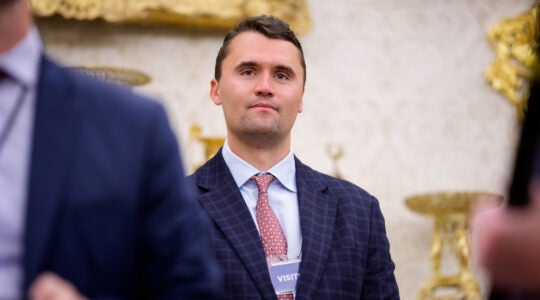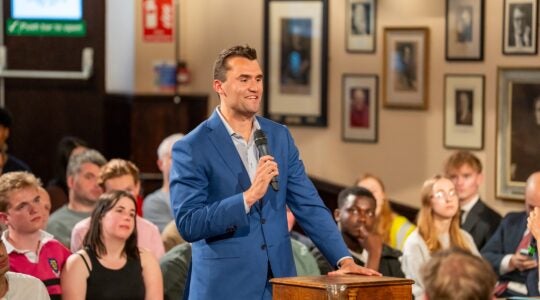WASHINGTON (JTA) — Got a problem with evangelicals cozying up to the Jewish community? That’s perfectly understandable, their representatives say.And here’s their solution: Cozy on up.Two prominent representatives of the evangelical community who addressed a panel Sunday at the Jewish Council for Public Affairs’ annual plenum said that if Jews feel uncomfortable with evangelicals, the solution is to expand the dialogue, not limit it. “Our community does not know how to dialogue,” said Susan Michael, U.S. director for the International Christian Embassy in Jerusalem. “We are very good at preaching, we are very weak at dialogue.” Her appeal: “Help us to learn.” David Brog, executive director of Christians United for Israel, acknowledged missteps by evangelical Christians who appear overzealous in their embrace of the Jewish community. But, he added, evangelicals who have encountered Jews are much less likely to offend them. “The evangelical community is maturing,” said Brog, who is Jewish. The conversation comes as evangelicals and Jews — after decades of a relationship fraught with Jewish fears of proselytizing and rejection of hard-line conservative Christian views on social issues — find they have more in common than they thought. Pastor John Hagee, founder of Christians United for Israel, is a keynote speaker next month at the American Israel Public Affairs Committee’s policy forum. The relationship is just now taking baby steps, said Alan Mittleman of the Jewish Theological Seminary, an expert on the role of Jews in the U.S. public square. Jews have become so used to parrying hostility that affection knocks them off-balance, he said. “Our problem is not that evangelicals dislike us, but rather that they love us,” Mittleman said in introducing the panel. The conversation among panelists and delegates from Jewish community relations councils across the country noted a number of Jewish-evangelical landmines. They include a sense among Jews that evangelicals’ eager references to Jesus amount to proselytizing and expectations among some evangelists of a quid pro quo in the form of Jewish backing for issues evangelicals care for, such as an abortion ban. Burt Siegel, director of the Philadelphia JCRC, recalled a friendly conversation that turned sour when an evangelical equated Palestinian suicide bombings “with the terrorism that is perpetrated on the fetus.” Brog said those were legitimate concerns, but avoiding evangelicals was not the way to deal with them. “We would all be better off with a little more tolerance of one another’s theological views,” he said. The primary Jewish response to a community whose support for Israel is unequaled “should be to say thank you,” Brog said to applause. Brog and Michael sought to dispel what they said were mischaracterizations of evangelicals. The U.S. evangelical community— numbering between 20 million and 50 million, depending on what degree of Christian fundamentalism one applies to the term — supports Israel for much the same reasons most Americans do, they said. Those include the biblical claim by Jews to Israel, the fact that Israel is a democracy and Israel’s alliance with the United States in the war against terrorism. Evangelicals “share our understanding of the threat from militant Islam,” Brog said. Concerns that evangelicals see the Jewish people’s return to Israel as a necessary step toward the end of days no longer has a basis, said Michael, who added that evangelicals have evolved since those views were popular in the 1960s and ’70s. “Some of our pioneers said things that we really don’t agree with today,” Michael said. “The prophetic stuff, that’s really not part of it.” Brog sought to dispel the idea that evangelicals are adamantly opposed to Israeli-Palestinian peace deals because of a desire to bring about the Armageddon of prophesy.”There is a big confusion between belief and motives,” he said.Most evangelicals do not attach a time line to their belief in an end of days, he said. If anything, Brog said, evangelicals are more disciplined than Jews at leaving Israel’s foreign policy to the Israelis themselves. He noted the degree of American Jewish opposition to land concessions in the 1990s and in 2005, when Israel evacuated settlers from the Gaza Strip. In all instances, Brog said, “evangelicals behaved with much more restraint than the Jewish community.” On the other hand, if the evangelical community perceives that the United States is forcing concessions on Israel against its government’s will, “they come down on the White House like a ton of bricks,” he said.Parrying Brog and Michael was the Rev. John Wimberley, a steering committee member of Presbyterians Concerned for Jewish and Christian Relations. Wimberley has played a central role in mending ties between his church and the Jewish community that frayed over a 2004 decision, since overturned, to back divestment from companies that do business with Israel, citing Israel’s treatment of the Palestinians. One of his frustrations in summoning support for Israel within his church, Wimberley said, is that mainline churchgoers have been stung by evangelical assaults on liberal briefs in reproductive choice, gay rights and church-state separation. Many liberal churchgoers have come to see support for Israel as another pillar in an evangelical doctrine they find oppressive, he said. “We need to get Israel detached from that larger political agenda,” Wimberley said. “It has become identified in this country with a bunch of things that divide us.” Brog countered that coalitions, by definition, bring together diverse groups that agree on one thing. He noted the recent alliance between evangelicals and environmentalists, who represent a demographic that otherwise would reject much of the evangelical agenda. Joe Rapport, a senior rabbi at Adath Israel Brith Shalom, a Reform synagogue in Louisville, Ky., suggested that it was simplistic to assume that diverse groups could coalesce easily around a single issue. Within the Jewish community, he said, he works with Orthodox rabbis, but “only those who accept the concept of pluralism.” Despite such qualifications, Rapport and others from Louisville effusively praised their evangelical neighbors. A “Night to Honor Israel,” one of the outreach initiatives of Brog’s group, drew 2,000 Christians on Super Bowl Sunday in early February. The Jewish community entered the project with some trepidation and drew red lines about proselytizing, but in the end an evening packed with falafel, Israeli dancing, renditions of “Hatikvah” and lots of hugs left them teary-eyed. “A lot of us were skeptical, a lot more were curious,” said David Kaplan, the Louisville JCRC director. “We came out with a sincere belief that they stand shoulder to shoulder with us in supporting Israel.” □
JTA has documented Jewish history in real-time for over a century. Keep our journalism strong by joining us in supporting independent, award-winning reporting.





